- Home
- Charles L. Grant
Night Songs Page 13
Night Songs Read online
Page 13
He changed his shirt, put on his boots and jeans, found his denim jacket and stood in the living room, hesitant, wondering.
The Screaming Woman on the table watched him, unmoving.
This is stupid, he thought then; this is really and truly and unquestionably stupid. He was stupid. He and his white horse had run into the real world without knowing what had happened. Haven's End, for all its insulation, wasn't a paradise found in some romantic's dream; it was a large plot of land that attracted interests more powerful than any fishing industry. He was only a teacher, and a part-time one at that, and someone who dared commit dreams to a canvas. What chance did he have then against men like Michael Lombard?
He crossed the room and dusted the carving absently.
In a way, he was very much like Gran, he thought. He didn't care for the comparison, though much of it rang true.
A shudder began in his shoulders and traveled to his neck, made his head palsied for several too-long seconds. Then he spun around and strode quickly outside, slid into his car and drove to Atlantic Terrace. He knocked on the door; twice more, and it opened.
***
When he was inside, both he and Peg began talking at once, laughing by the time he'd crossed the threshold, holding hands without thinking when they walked into the front room. Matt was sprawled on the window seat, and he was giggling when he saw them. Colin instantly tried to pull away, but Peg wouldn't let him.
Then he suggested the drive a third time, telling her he was worried about Lilla; after all, her real home was only two doors down and there was no reason at all why she should stay out at the shack, especially since Gran's place would probably flatten in the Screamer. Peg had agreed without hesitation, and Matt was already charging for his coat and telling them the Foxs' invitation to dinner was still good. He had the door open long before they got there, giving them a mock bow from the waist and winking at his mother.
"You okay?" Colin asked, bending over at the threshold to examine the boy's eyes.
"Sure." Matt shrugged.
"She scared you, huh?"
"She's weird!"
"No, she's just… unsettled, Matt. It isn't easy for someone like her to lose what's left of her family." He crouched, his hands draped over his knees. "Eighteen may seem awfully old to you, pal, but believe me, it isn't."
"Eighteen isn't old," Matt said. "Thirty is."
"Thank you," he said, frowning and throwing a mock punch at his arm. "And your mother thanks you, too."
"Colin!"
He exaggerated a wince, winked once, and stood. Five minutes later they dropped him off at the marina, Alex Fox waiting by the door with a reassuring wave.
"Are you sure you're all right?" he said as he steered the car onto Neptune and headed slowly south toward the cliffs. The road was narrow and slightly humped in its center, the broken yellow lines fading nearly to gray. Though it wasn't really cold, he had his jacket zipped up to his chin.
"I was spooked, that's all," Peg said. Her hair was tied back in a ponytail, exposing her ears and the side of her pale neck. Her coat was red, her shirt a vivid plaid, and she was slumped in her seat so her knees rested against the dash. She turned her head toward him and smiled. "Really. Seeing Matt like that just scared me to death."
"Well, if you're sure."
She looked at him, almost laughing. "Yes, Mother Ross, I'm sure. I've been on edge all day. For that matter, it hasn't been a very pleasant week, either."
They rode past the drug store, a pair of clothing stores, the luncheonette, all on the right. The bench where Gran did many of his carvings was deserted, and Colin shook his head.
"It doesn't look right, does it?" he asked.
Peg glanced at the bench, and the thin oak sapling struggling beside it. "No."
They passed the chalet-shaped bank, the movie theater Bill Efron's brother ran, and Syd Naughton's market, all on the right. There were several cars in the parking lot, and he was tempted to stop when he saw Syd pushing several shopping carts toward the door, at the same time arguing loudly and with violent, one-handed gesticulations with three men who trailed behind him. They were in workclothes, fishermen just off their boats.
"No catch," Peg said when she saw him looking. "Soon as I got home I got a call from Ed Raines' wife complaining. All day, and they didn't catch a single damned fish."
"Why'd she call you?"
She twisted a stray hair around her finger. "She owes for a prescription. A pleasant way to spread gossip and tell me she can't pay me this week." She stared until the market fell behind them, was replaced by a gas station, three houses, and the forest. "Matt thanks you."
"For what?"
"For taking me out. I was driving him crazy."
He grinned. "I was driving myself crazy." He slumped a little to ease the strain on his stomach, and saw Peg watching him with a concerned frown. "Exercising," he explained. "I lost my balance and fell into the kitchen table."
She looked straight ahead. "You're driving awfully slow."
"It's a lovely day."
"It was."
The clouds in twilight deepened the shadows on the road. He switched on the headlights. His stomach ached, and there was pressure in his chest that made him breathe through his mouth. He sniffed, rolled up his window and planted his elbow on the frame. He hummed, whistled a bit, sniffed a second time and was silent.
"What happened at Bob's?"
With his right hand on the steering wheel, and left raked into his hair, he shrugged. "We discussed his visit to you and his call to me."
She looked at him skeptically. "Discussed?"
"I met Lombard and Vincent, too."
Her mouth opened to say, "Oh, but nothing came out. She only looked out the window, at the trees and the underbrush and the midnight darkness beneath the boughs.
They drifted between the two motels, had gone only a hundred yards beyond when he pulled over to the side, turned off the ignition, and twisted around on the seat with one arm stretched across the back. Peg straightened, her hands in her lap.
"There was never anything between Lilla and me, Peg."
Her hands clasped, and she stared at them, nodding. "Really."
"I believe you. I told you it was the day, that damned storm coming."
He tried to see through her, into her, find the paths that led to whatever created her thoughts and emotions and the laugh that made him smile even when he was sleeping. He had been frightened in the restaurant, just before he was struck, but the fear he knew now was something considerably more.
"You know," he said, "once, when I was in Massachusetts, there was this old man who lived down the street. He ran an antique shop for the tourists and for the college students who needed furniture for their dorms. He'd charge one price for the students and twice as much for the others. He-"
She looked at him suddenly, one corner of her mouth pulling back in a smile. "Is this one of your stories, Col?"
"Huh?"
"One of your stories," she said. "Every time you want to say something you think is important, you have to start off with a story of some kind. And every time," she added with a disarming smile, "it doesn't have a thing to do with whatever you're saying."
He leaned away slightly. "I do that?"
She nodded.
"All the time?"
She nodded again.
"I'll be damned."
She laughed soundlessly and lay a palm to his cheek, pulled the hand away and covered his on the seat's back. "Just tell me, Col. This once, just tell me."
His tongue swiped at his lips once, and his cheeks puffed with apprehension. "It's-"
"Just tell me."
He watched her for a long time, and she didn't look away. Then he tucked his chin toward his chest and took a deep breath. "I want to marry you, Peg. I mean, I want you to marry me. I mean, will you marry me is what I mean. I mean. Yes." He nodded once, sharply. "Yes, I want to marry you."
"Then it's mutual," she said.
&nbs
p; "No joke," he said, his stomach suddenly feeling queasy and hollow.
"No joke, Colin."
He frowned. "But I've never said I loved you."
She slid toward him and laced her hands around the back of his neck. "Yes you have," she said quietly. "Every time I see you." She kissed him, and he sighed and wrapped his arms around her, kissed her gently and leaned his chin on her shoulder while he stared at the trees.
"This is… nice."
She said nothing.
"I mean, this is great! I mean-" He pulled away and looked at her, frowning until he saw the color slipping from her face. "Peg?" Her lips were quivering just enough for him to see, and her right hand was pushing hard at his shoulder. He turned. "What's…" His eyes widened.
Across the road was an elm whose branches had been shaped by the wind until they grew around the trunk, leaning away from the ocean. The bole was wide and gnarled, several knobs of roots thrust through the ground.
He saw a hand there, part of an arm, a dark shape beyond them stretched under the tree.
The hand was a dull red, and so were the leaves beneath it. Peg was out of the car before he could move, waiting by his door when he finally realized she was gone. They held hands as they crossed the tarmac, slowly, trying not to stare and staring just the same. At the opposite verge she stopped and pulled back, but Colin released her and kept going until he could see Warren Harcourt sprawled in the shadows.
A fly walked across the dead man's brow.
"Oh… Jesus," he whispered, and closed his eyes, too late. At the man's neck, over his coatfront, and staining the tops of his sandy bare feet… never in his life had Colin seen so much blood.
***
Tess Mayfair liked to cook. If she had her way, she'd stay in the yellow-and-copper kitchen from breakfast to dinner and do nothing but watch the blue flames on the stove reach under the pots to boil the water and brown the fries and crisp the potato skins and curl the bacon. All while the TV on the windowsill would play her favorite western.
These days, of course, there was precious little to do what with the summer people gone and Muriel North working nights at the drug store and no one else from town bothering to come out to see her. That left her alone. All alone. Alone enough to wish sometimes she hadn't driven her third husband away five years ago because he was fooling around with a girl he'd met on the beach in July. And that's what she was. A girl. Thirty years younger than he, and there she was with her tanned little stomach and her tanned little legs and no chest to speak of and no brains, either, considering her choice.
It was damned embarrassing.
She'd seen him with her twice, suspected him more than that, and in a temper and snit on a Sunday afternoon she'd packed his bags and left them on the porch. Locked the door. Pulled down the shades. Listened to him bellow and plead and finally tell her what he thought of her and her westerns, while he staggered and stumbled down the flagstone walk to the street, staggered and stumbled along the pebbled verge until he was out of sight. Still yelling. Still cursing.
Five years gone, and the son of a bitch hadn't even sent her a postcard.
Crumb didn't even know what he was missing. Lord, she still had all her teeth, and her hair was still black without any fancy rinses, and her eyes were still bright and brown, and so what the hell if she was a little overweight.
She sniffed, and shook her head and plunged her hands back into the dishwater. A slow job tonight, just her own plates and coffee cup. As she stood at the sink she looked out at the garden through the gap in the yellow chintz curtains on the eye-level window. Next spring, she decided, she'd have to do a little weeding. Zinnias didn't grow this year, and those fool roses looked like hell. The wall of irises on the left she didn't need to touch at all; they were like her, independent and strong and too stubborn to die. The squirrels had dug up the tulip bulbs, though, all around the birdbath. Mums and tulips, she decided with a nod that rippled her three chins, mums and tulips against the birdbath.
She reached for a towel to dry her hands -
She reached for a cold roll she hadn't eaten at dinner.
She looked out the window again before heading in for the big TV in the living room, and saw the boy standing just in the trees.
A groan of exasperation, the dishcloth splashed back into the sink. Why, she wondered, didn't they ever learn? Every year it was the same thing. They didn't even bother to think of something new-wait until she had put a tape on the machine, or was watching a regular show, then sneak up the back and make a grab for the bowl on the concrete pedestal. They thought she couldn't hear them, but they didn't know she had ears that would put a prime fox to shame. They thought she couldn't run, but she grinned when she remembered the summer Cart Naughton had made it all the way to the birdbath, and she was out the door and down the steps before he could look up. Just a little luck and she would have had him, had his neck in her hands and his life popping out his eyes. But he ducked, and all she got was his black leather jacket.
The scream he gave when it tore off his back and dangled in her hand had her laughing for a week. She even tied it to the flagpole in front of the house and prayed he'd try to get it back. A lot of kids drove by and yelled, pointed, laughed when she beckoned with a sweet smile and a fist hidden behind her waist. But Naughton never came for it, and finally a storm ripped it free and blew it away.
So there he was again, and she sighed. On another day she would have welcomed the fun, but not tonight. Tonight she needed to rest because today had been worse than the hottest day in August-sweat bulging on her forehead, making her hair itch, had her looking out every window in the house hunting for the thunderheads she was sure were overhead. It wearied her. It made her think about starting that diet again, maybe even cutting down on her smoking.
She wasn't in the mood for this crap, not at all, not at all.
So she picked up the baseball bat she kept by the stove and she pulled open the door.
"Damn you," she shouted in her worst, fiercest voice. The boy didn't move.
She leaned forward, peering, and the breeze took the hem of her print dress and snapped it at her legs, drew it tight across her massive chest, puffed the sleeves and gave her a chill. A brittle leaf bounced across the porch. Tentacles of ivy dropped from the gutter and wove at her, scratching the air and whispering to themselves.
"Beat it!" she shouted.
The boy didn't move.
The woods behind him were encased in black, a soft and shifting black that shaded up toward dark green. She could hear a gull wheeling overhead, and the faint sound of the ocean moving in with the tide. A step forward, she grabbed a roof post, held the bat on her shoulder and decided that this might be better than TV.
"Well, if you're gonna do it, do it," she said, pretending she didn't give a damn one way or the other.
The boy shifted, and she could finally see his freckled face, his curly brown hair, those skinny arms that could barely lift his trousers around his skinny waist.
"Oh Lord, Frankie," she said as she moved down to the lawn, "what are you tryin' to do, anyway?" She laughed then, loudly. "You think you can really lift that thing?" She pointed at the bowl with the bat. "You lift it, boy, you can have it."
She waited.
Frankie began walking toward her, and she matched him step for step. She was in Dodge City now, facing down the Adams Kid, and there was no way in hell he could win because she had all the townspeople with rifles hiding in the hotel and the saloon and in the general store. Tim McCoy was on the stable roof, Ken Maynard was in the post office, and over there behind that buckboard she had Bob Steele waiting.
She smiled.
The goddamned Adams Kid was going to get himself blown dead away.
When they were ten feet apart, the birdbath between them, she finally saw his eyes. They were wide. And they were white. No color. Just white.
She frowned. "Frankie, you on something?" He reached for the bowl.
"Frankie, damn it, you an
swer me, boy. I ain't so old I can't give you a lickin' to learn you your manners."
He gripped the sculpted edges. His eyes were white.
Her tongue brushed her lips. She didn't like the way he looked at her, no expression, no nothing. Maybe he was wearing one of them fancy contact lenses she read about in the TV Guide, that changes a person's eye color for the part he was playing.
He lifted the bowl.
Her palms were suddenly wet. The muscles in those skinny arms weren't even bulging, and he was holding the bowl as if it were paper.
"Frankie…" she said, backing away.
The wind snarled her hair in front of her face. She brushed at it impatiently, and when she could see again he was holding the bowl over his head.
Jesus Lord, she thought, he's going to throw it. The little prick's gonna throw it.
The bat dropped from her hand as she turned and started to run. Muscles or no muscles, she could outrun the little bastard any day of the week and twice on Sundays, and once she got to a phone she was going to call Garve and let him know that Frankie Adams was destroying private property. The little crumb was just like her husband-no respect for her and hers.
At the steps she turned, to be sure he wasn't following.
Frankie suddenly turned sideways and threw the concrete bowl like an oversized discus.
It came slow. It came fast. It may have hummed and it may have wobbled and it might have just missed her if she had ducked in time.
It struck her just below her breasts and smashed her through the door.
The small TV on the sill fell into the sink and shattered.
Frankie walked across the garden.
The wind didn't touch him, and his eyes were solid white.
FOUR
The wind came alive just after sunset, just as twilight had turned to autumn dusk.
Wally Sterling sat on a high, three-legged, peeling red stool in the ferry's cramped cabin jutting over the water from portside, center. Its octagonal walls were glass from waist to squared flat ceiling, the narrow panes pitted and smeared by salt spray and driven sand. The boat rocked gently, boards creaked, chains swayed. A gull pecked at a candy wrapper lying in the stern. Out of the chest-high side walls rose tall iron rods looped at the top and strung through with roping from which bleached plastic pennants hung, listless and dripping.

![[Oxrun Station] The Orchard Read online](http://i1.bookreadfree.com/i/03/17/oxrun_station_the_orchard_preview.jpg) [Oxrun Station] The Orchard
[Oxrun Station] The Orchard![Riders in the Sky - [Millennium Quartet 04] Read online](http://i1.bookreadfree.com/i/03/20/riders_in_the_sky_-_millennium_quartet_04_preview.jpg) Riders in the Sky - [Millennium Quartet 04]
Riders in the Sky - [Millennium Quartet 04]![Chariot - [Millennium Quartet 03] Read online](http://i1.bookreadfree.com/i/03/19/chariot_-_millennium_quartet_03_preview.jpg) Chariot - [Millennium Quartet 03]
Chariot - [Millennium Quartet 03]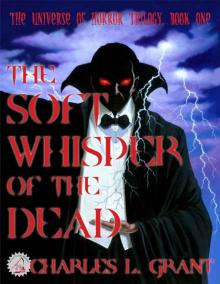 The Universe of Horror Volume 1: The Soft Whisper of the Dead (Neccon Classic Horror)
The Universe of Horror Volume 1: The Soft Whisper of the Dead (Neccon Classic Horror)![[Oxrun Station] Dialing The Wind Read online](http://i1.bookreadfree.com/i/03/19/oxrun_station_dialing_the_wind_preview.jpg) [Oxrun Station] Dialing The Wind
[Oxrun Station] Dialing The Wind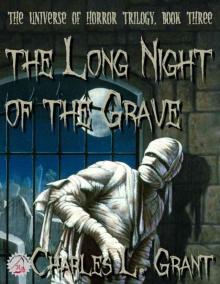 The Universe of Horror Volume 3: The Long Night of the Grave (Neccon Classic Horror)
The Universe of Horror Volume 3: The Long Night of the Grave (Neccon Classic Horror)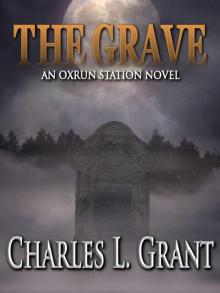 The Grave - An Oxrun Station Novel (Oxrun Station Novels)
The Grave - An Oxrun Station Novel (Oxrun Station Novels)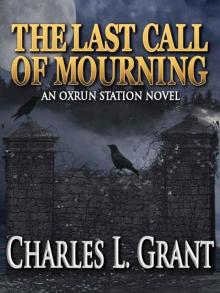 The Last Call of Mourning - An Oxrun Station Novel (Oxrun Station Novels)
The Last Call of Mourning - An Oxrun Station Novel (Oxrun Station Novels)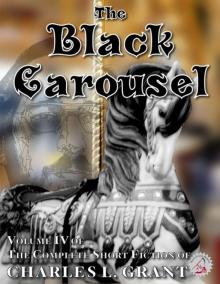 The Complete Short Fiction of Charles L. Grant, Volume IV: The Black Carousel
The Complete Short Fiction of Charles L. Grant, Volume IV: The Black Carousel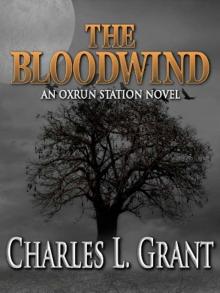 The Bloodwind - An Oxrun Station Novel (Oxrun Station Novels)
The Bloodwind - An Oxrun Station Novel (Oxrun Station Novels)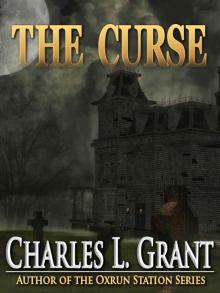 The Curse
The Curse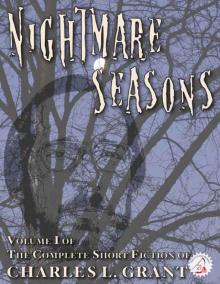 The Complete Short Fiction of Charles L. Grant Volume 1: Nightmare Seasons (Necon Classic Horror)
The Complete Short Fiction of Charles L. Grant Volume 1: Nightmare Seasons (Necon Classic Horror)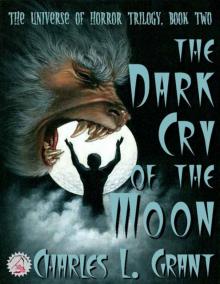 The Universe of Horror Volume 2: The Dark Cry of the Moon (Neccon Classic Horror)
The Universe of Horror Volume 2: The Dark Cry of the Moon (Neccon Classic Horror)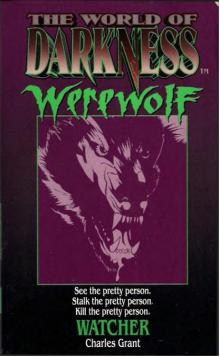 Watcher: Based on the Apocalypse (World of Darkness : Werewolf)
Watcher: Based on the Apocalypse (World of Darkness : Werewolf)![[Oxrun Station] The Bloodwind Read online](http://i1.bookreadfree.com/i/03/25/oxrun_station_the_bloodwind_preview.jpg) [Oxrun Station] The Bloodwind
[Oxrun Station] The Bloodwind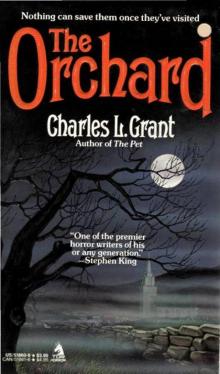 The Orchard
The Orchard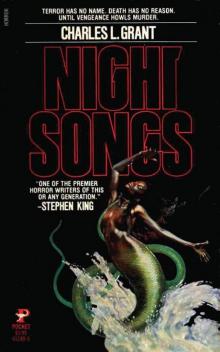 Night Songs
Night Songs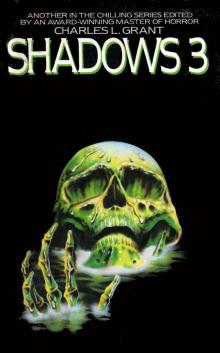 Shadows 3
Shadows 3![Symphony - [Millennium Quartet 01] Read online](http://i1.bookreadfree.com/i1/04/02/symphony_-_millennium_quartet_01_preview.jpg) Symphony - [Millennium Quartet 01]
Symphony - [Millennium Quartet 01] The Hour of the Oxrun Dead (Necon Classic Horror)
The Hour of the Oxrun Dead (Necon Classic Horror)![In the Mood - [Millennium Quartet 02] Read online](http://i1.bookreadfree.com/i1/03/31/in_the_mood_-_millennium_quartet_02_preview.jpg) In the Mood - [Millennium Quartet 02]
In the Mood - [Millennium Quartet 02]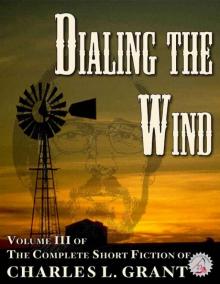 The Complete Short Fiction of Charles L. Grant Volume 3: Dialing the Wind (Neccon Classic Horror)
The Complete Short Fiction of Charles L. Grant Volume 3: Dialing the Wind (Neccon Classic Horror)![[Oxrun Station] The Last Call of Mourning Read online](http://i1.bookreadfree.com/i2/04/05/oxrun_station_the_last_call_of_mourning_preview.jpg) [Oxrun Station] The Last Call of Mourning
[Oxrun Station] The Last Call of Mourning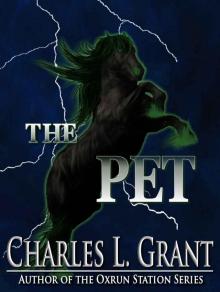 The Pet
The Pet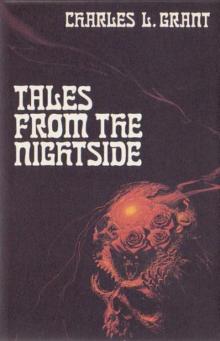 Tales from the Nightside
Tales from the Nightside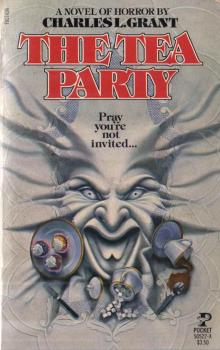 The Tea Party - A Novel of Horror
The Tea Party - A Novel of Horror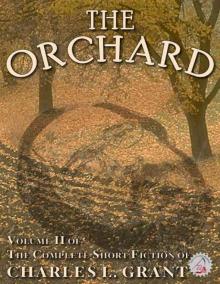 The Complete Short Fiction of Charles L. Grant Volume 2: The Orchard (Necon Classic Horror)
The Complete Short Fiction of Charles L. Grant Volume 2: The Orchard (Necon Classic Horror) Whirlwind
Whirlwind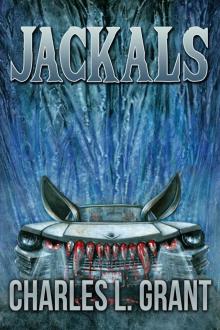 Jackals
Jackals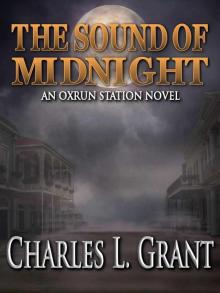 The Sound of Midnight - An Oxrun Station Novel
The Sound of Midnight - An Oxrun Station Novel